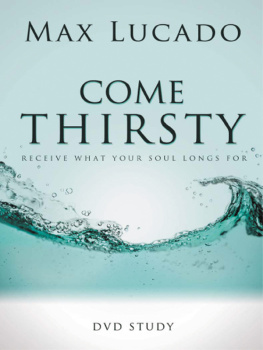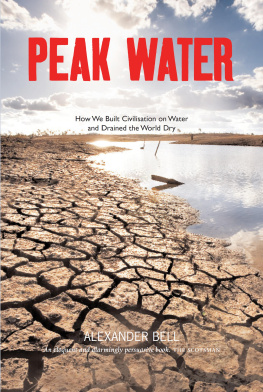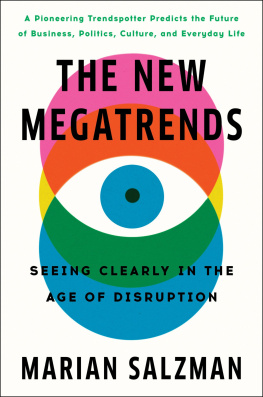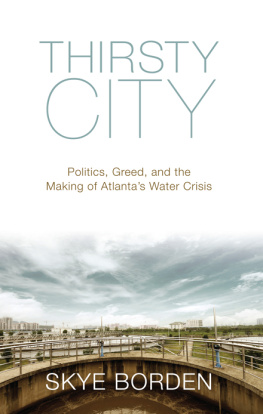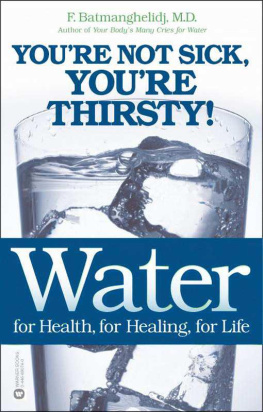Michael H. Salzman - New water for a thirsty world.
Here you can read online Michael H. Salzman - New water for a thirsty world. full text of the book (entire story) in english for free. Download pdf and epub, get meaning, cover and reviews about this ebook. year: 1960, publisher: Science Foundation Press, genre: Religion. Description of the work, (preface) as well as reviews are available. Best literature library LitArk.com created for fans of good reading and offers a wide selection of genres:
Romance novel
Science fiction
Adventure
Detective
Science
History
Home and family
Prose
Art
Politics
Computer
Non-fiction
Religion
Business
Children
Humor
Choose a favorite category and find really read worthwhile books. Enjoy immersion in the world of imagination, feel the emotions of the characters or learn something new for yourself, make an fascinating discovery.

- Book:New water for a thirsty world.
- Author:
- Publisher:Science Foundation Press
- Genre:
- Year:1960
- Rating:5 / 5
- Favourites:Add to favourites
- Your mark:
- 100
- 1
- 2
- 3
- 4
- 5
New water for a thirsty world.: summary, description and annotation
We offer to read an annotation, description, summary or preface (depends on what the author of the book "New water for a thirsty world." wrote himself). If you haven't found the necessary information about the book — write in the comments, we will try to find it.
New water for a thirsty world. — read online for free the complete book (whole text) full work
Below is the text of the book, divided by pages. System saving the place of the last page read, allows you to conveniently read the book "New water for a thirsty world." online for free, without having to search again every time where you left off. Put a bookmark, and you can go to the page where you finished reading at any time.
Font size:
Interval:
Bookmark:
by Michael Salzman
Foreword by Aldous Huxley
science foundation press
How odd it is that anyone would not see that all observation must be for or against some view, if it is to be of any service.
Charles Darwin

SCIENCE FOUNDATION PRESS Publishers 73314 Ascot Station I.os Alludes 3, California
New '
/ WATER FOR A THIRSTY WORLD
Copyright 1960 by Michael H. Salzman. All rights reserved. This book, or parts thereof, may not be reproduced in any form without permission from the author and the publisher.
LIBRARY OF CONGRESS CATALOG CARD NUMBER: 60-9611
Printed and Manufactured in the United States of America by
Murray & Gee, Inc.
3630 Eastham Drive Culver City, Calif.
For demonstrating his firm belief in democracy, individual initiative, free enterprise, and the need for open minds to the end that all men may be truly free to think and solve the great problems of their times.
As a child, born into a rainy country and brought up in the midst of what at that time was advanced modern plumbing, 1 took water for granted. One turned a tap and water appeared. That was all there was to it. With foreign travel came the discovery that things werent as simple as all that. I rented a delightful villa in the hills above Florence. What a paradise! But the pump that should have raised the bath water from a well in the courtyard stopped working; and a little later, when the pump had been repaired, there was no water in the well. From one dry hole I moved on to a succession of vast dry regions. I crossed the deserts of Rajputana and what is now Pakistan; I visited the city of Bikaner, where the water supply is hoisted from deep wells by oxen harnessed to a rope, at the other end of which is a leather bucket. Then came the deserts of the American Southwest, seen first at the end of a wet cycle and later lived in during a prolonged drought which finally dried my well and the wells of most of my neighbors. No rain, no water in the wells. It stands to reason, doesnt it? But in some places there is no rain, and yet an unfailing abundance of water in the wells. At Nefta in the Sahara, at Jericho in the Jordan valley, I saw things which, , by all the rules of common sense, I had no right to be seeing. Nefta
lies in a part of the desert where it rains on the average once every three or four years; for the rest of the time there is only wind and sunshine. But though no water falls from the sky, water comes pouring out of the groundenough water to support a forest of date palms and a population, in that incredibly fertile oasis, of several thousands. And after Nefta there was Jericho. Jericho is the site of the first walled city, built by a neolithic people thousands of years ago. And for thousands of years before that city was built men had lived on what was to become its site. Jericho is and has always been an island of greenery in the barren land. In a place where, by all the rales, there should be no water, a spring gushes out of the rock and has been gushing from time immemorial. From these two sets of object lessons I learned two significant facts about water; first and most obviously, that over vast expanses of the earths surface, water is scarce or non-existent; and second (to my extreme puzzlement) that here and there water makes its appearance in places where it seemingly has no right to be present.
Such was the extent of my knowledge when, some few years since, I first met Stephan Riess. After seeing a few of his wells spouting water from the solid granite at the rate of two or three thousand gallons a minute, and after listening to what he had to say about faults and fissures, about juvenile water and primary water, about hydrogen and oxygen coming together at high temperatures and under vast pressures in the bowels of the earth and rising, as H20 towards the surface, wherever the crust was weak, I began to understand the mystery of Nefta and Jericho; and I began at the same time to feel a little more hopeful about humanitys prospects for survival and a good life on this underwatered and soon to be overpopulated planet.
And now comes Michael Salzmans book. Jack of all trades and master of four or five, Salzman is one of those rare, indispensable men who refuse to confine themselves to a single academic pigeonhole, but with systematic restlessness and a boundless curiosity climb about on the woodwork between the specialists insulated boxes, peering in now here, now there, and correlating the knowledge they extract from each compartment into a comprehensive pattern that permits a better understanding of the artificially isolated facts and, along with a better understanding, the possibility of new and more fruitful kinds of action.
If Riess is right (and the proof of the pudding is in the eating or rather, since we are dealing with water, in the drinking), and if Salzman has correctly stated the chemical and geological reasons why Riess finds water in places where orthodox hydrologists affirm that it cannot possibly exist, then clearly we must be prepared to make a number of revolutionary changes in our ideas and our policies. If brand new, primary water can be found near the place where it is to be used, then the building of huge dams to impound old waters, and the digging of long canals to lead the water to its place of use, will become completely unnecessary. Every reservoir behind a dam is bound, sooner or later, to silt up. By the time California has iifty million inhabitants and live or six times its present water needs, Lake Mead will be well on its way to becoming the worlds largest beaver meadow, and the Feather River Project, after bankrupting the state, will be hard at work depositing mud. If Riess and Salzman are right, the needs of Californias future millions can best be supplied, not by inordinately expensive dams and aqueducts, but by drilling into faults and fractures for local sources of new primary water.
Again, if Riess and Salzman are right, it will be possible to use the applied science of tapping primary water in order to ease the political tensions and alleviate the chronic miseries of the Middle East and Africa. The high dam at Aswan will reach completion at a date when Egypts population will have already outstripped the yield of the new lands which that future beaver meadow will have made fertile. How much quicker, cheaper and more efficient to start drilling for primary water in the rocks that shut in the Nile Valley! Time is everywhere against us; and unless we can provide enough extra food in the desperate interim between present population explosion and future population stabilization, the social, economic and political consequences of death-control without birth-control are bound to be disastrous. The extra food can be produced most rapidly by supplying the vast dry areas of the earth with water; and this in turn can be done most rapidly by locating and exploiting those deep telluric sources which (if Riess and Salzman are right) are nearly ubiquitous and for all practical purposes inexhaustible.
And even in those regions where rain falls and rivers run, primary water may turn out to be useful and even indispensable. As population grows and technology advances, more and more water is consumed. And not only is more and more water consumed; more and more sources of water are polluted. To the chemical and excre-mentitious pollution with which we defile our rivers, lakes and beaches there is now added regularly radio-active pollution. Dangerous even in peace time, such radio-active contamination might have the most appalling consequences during and after a war. In the years ahead, and for the inhabitants of densely populated and highly industrialized countries, sources of uncontaminated and uncontaminable water will become increasingly valuable.
Font size:
Interval:
Bookmark:
Similar books «New water for a thirsty world.»
Look at similar books to New water for a thirsty world.. We have selected literature similar in name and meaning in the hope of providing readers with more options to find new, interesting, not yet read works.
Discussion, reviews of the book New water for a thirsty world. and just readers' own opinions. Leave your comments, write what you think about the work, its meaning or the main characters. Specify what exactly you liked and what you didn't like, and why you think so.


